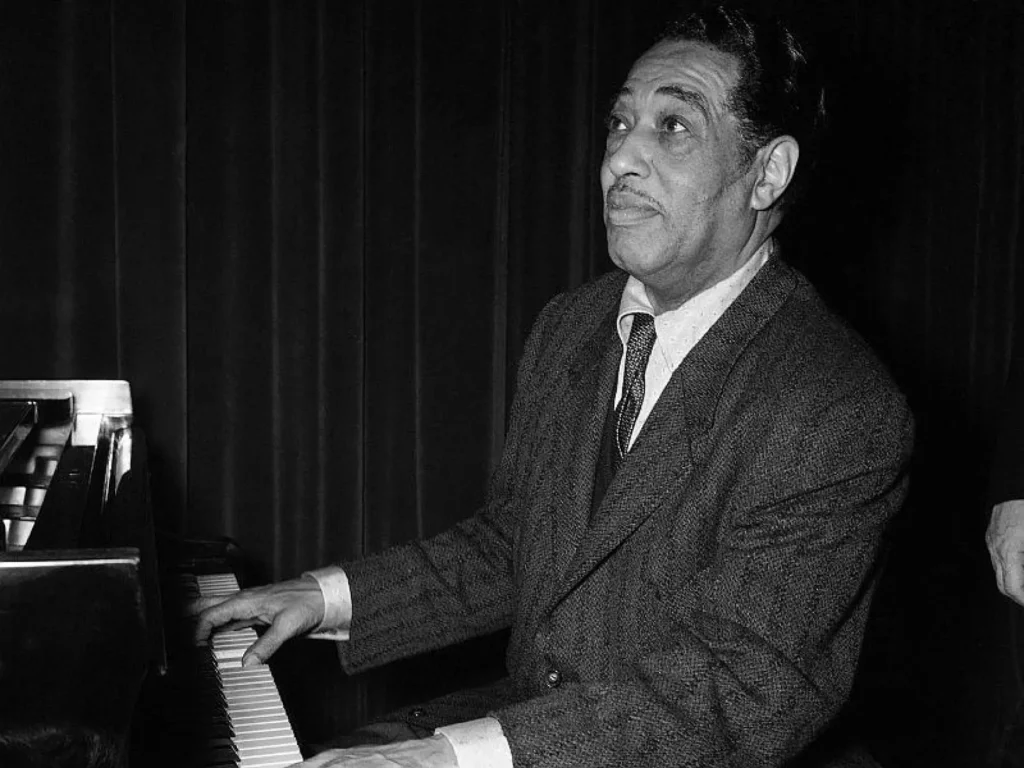As befitting the legacy of Duke Ellington, who led his renowned orchestra for nearly 50 years and criss-crossed the globe as an unofficial musical ambassador, there are Duke Ellington Society chapters in Toronto, Stockholm, London, and Paris, in addition to New York, Los Angeles, and Ellington’s birthplace, Washington, D.C. I’ve been a member and have attended several of TDES’s gatherings at St. Peter’s Church in New York where I’ve heard talks by the Ellington scholars and aficionados as John Edward Hasse, David Hajdu, Stanley Crouch, and Dan Morgenstern, and heard Duke’s music played by a variety of jazz artists.
Today is Edward Kennedy Ellington’s 120th birthday anniversary. Twenty years ago, TDES chapters buzzed with activities around his centennial of April 29, 1999. On the day itself, Gene Norman spoke about Duke at a gathering in Los Angeles. Before I saw footage of his address, I knew Norman’s voice best from his introduction of Max Roach and Clifford Brown at a Gene Norman Presents (GNP) concert in Hollywood in 1954. Norman was out front in presenting Max and Brownie’s original quintet with Teddy Edwards in April of that year, and then in August he presented them at the Shrine Auditorium. I readily recall Gene intoning, “We very proudly present the Max Roach All-Stars with Clifford Brown,” just as I do hearing Max say, “We hope you enjoy our interpretation of [Duke Jordan’s] ‘Jordu’.”
45 years later, a tuxedoed Norman addressed the Duke Ellington Centennial conference. The voice may be familiar, but the perspective was fresh then and remains so today. As Kenny Burrell put it, “Ellington is forever.” Norman, who says he became “transfixed” by Duke’s music as a nine-year-old, produced Ellington concerts over a 16-year period. His first impression of Duke was of a man in top hat and tails, but he got to know him in his backstage attire of “bathrobe and stocking cap,” tirelessly and “compulsively” at work on new tunes. He begins the talk by quoting Henry Miller, who hailed Ellington as “super civilized” in his novel, The Colossus of Maroussi. Miller’s complete tribute reads, “I let a song go out of my heart to Duke Ellington, that suave, super-civilized, double-jointed cobra.” Norman remembers Duke as “charmingly elusive…svelte…and when it came to the ladies, he was no longer Duke, he was Prince Charming.”
Speaking of charm, conjecture abounds over how slyly Ellington may have lifted ideas and melodic fragments from his sidemen for use in his songs and compositions, which number over 1500. Norman provides an example here of how a counter-melody that Johnny Hodges played on “Once in a While” grew to become “I Let a Song Go Out of My Heart.” But to those who smugly dispute Ellington’s originality, Norman counters with, “Talent borrows from others, but genius borrows only from itself,” and notes how magnanimous it was for Duke to use Billy Strayhorn’s “Take the A Train” as his theme song for over 33 years.
Norman names Oscar Wilde, Gustav Mahler, George Gershwin, and Ellington as his heroes, but Duke was the only one he got to know. As you’ll see in this ten minute address, he’s still imbued with love for the man.
